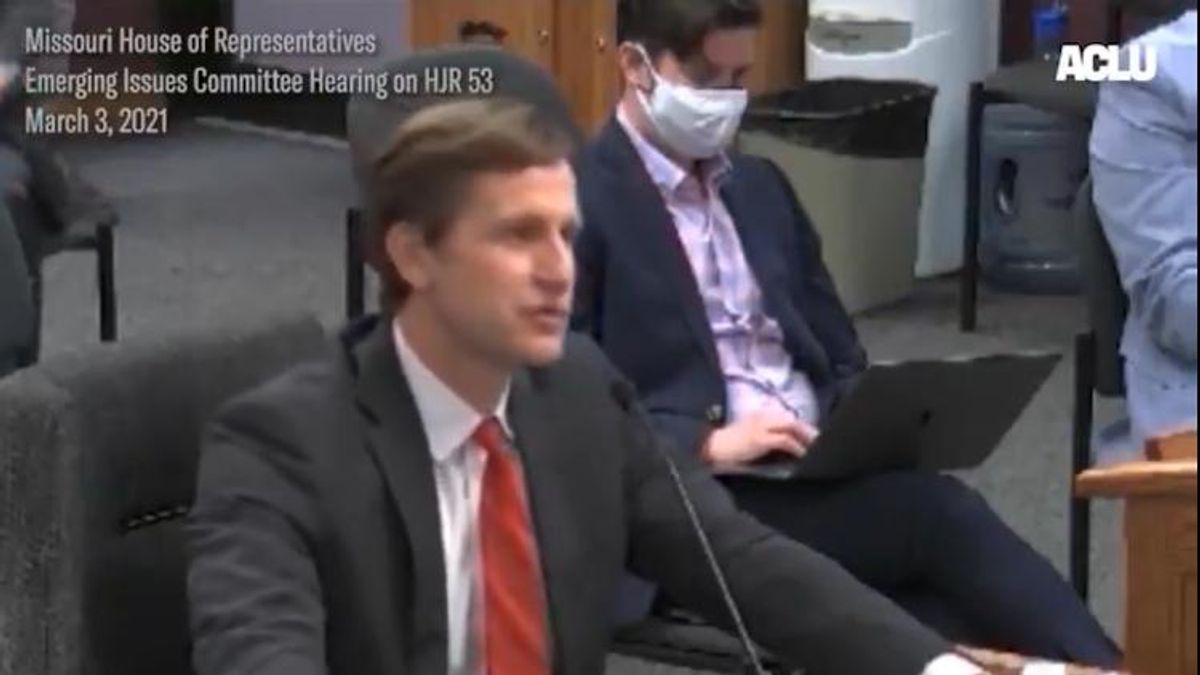A Missouri father is becoming known nationwide after testifying to the state legislature in support of his transgender daughter.
Brandon Boulware, a lawyer and father of four, spoke March 3 to the Missouri House of Representatives, urging them to reject House Joint Resolution 53, which would bar trans girls from competing alongside cisgender girls in school sports. Unlike most bills on this issue pending around the nation, HJR 53 would write the ban into the state constitution.
In the video, circulated this week by the American Civil Liberties Union, Boulware spoke about how much happier his daughter has been since he and his wife allowed her to be herself. They had forced the child, who was assigned male at birth, to dress in boys' clothing, wear her hair short, and play with toys stereotypically associated with boys, even though she identified as female.
He said he did that to protect his daughter and the rest of the family, but she was miserable. The day everything changed, he said, was when his daughter, clad in one of her sister's dresses, asked if she could go across the street and play with some other kids. He said no, and she then asked if she could do so if she changed into boys' clothes.
"It was then that it hit me, that my daughter was equating being good with being someone else," Boulware said. "I was teaching her to deny who she is. As a parent, the one thing we cannot do, the one thing, is silence our child's spirit."
After that, he and his wife allowed her to wear the clothing she wanted, to grow her hair out, and generally be who she is, he said. The transformation was immediate: "I now have a confident, a smiling, a happy daughter," he said. "She plays on girls' volleyball teams. She has friendships. She's a kid." He exhorted legislators not to take this happiness away from his daughter or other children.
The ACLU posted the video Sunday on Instagram, where it has received more than 250,000 likes so far. It tweeted the video Monday, and it has received 27,000 likes on Twitter and has been retweeted nearly 11,000 times.
The bill was approved by one House committee last week and awaits action in another, The Kansas City Star reports. As it is a constitutional amendment, if it's passed by both houses of the legislature, it would then go before voters, and advocates for trans rights are concerned about the kind of rhetoric its backers would use to persuade voters.
"All kinds of people across the state will see ads run and horrific stories written and op-eds from people who don't know anything about the trans experience," transgender girl Avery Jackson testified to legislators recently, according to the Star. "No one should have to see their experience debated by their neighbors."
Missouri is also considering a bill that would prevent minors from receiving gender-affirming medical procedures. Many bills similar to that are pending around the nation too.
"They can go to all the counseling and dress and change their name and whatever they want to do, I just don't want them medically treated with drugs," said Rep. Suzie Pollock, the Republican legislator who's sponsoring the measure, House Bill 33. "In what other area do we allow children to make those decisions so young?"
But trans youth and their parents who testified to lawmakers over the past two weeks pointed out that those decisions are not made lightly and that parents are usually involved, the Star reports.
"This was not me being like, 'Oh, one day I'm going to wake up and I'm going to choose this, and the next day I'm going to be this,'" trans teen Samantha DeMichieli said in her testimony. "This is the clearest decision I've ever made in my life."
HB 33 has yet to receive a committee vote. It is one of 82 anti-trans bills introduced at the state level during this legislative session, a record number. About half the bills seek to keep trans girls off girls' sports teams, based on the much-disputed assertion that trans girls have an inherent and unfair advantage in athletics, and many of the rest are aimed at denying medical care.
Mississippi is the only state where one of the bills has been signed into law this session, in its case an anti-trans sports bill that was signed by Gov. Tate Reeves last week and takes effect July 1. South Dakota Gov. Kristi Noem has said she will sign a similar bill in her state as well. The only state where a trans-exclusionary sports bill has become law is Idaho, which enacted the measure last year, but it is the subject of a court challenge and has been blocked by a federal judge.


















































































